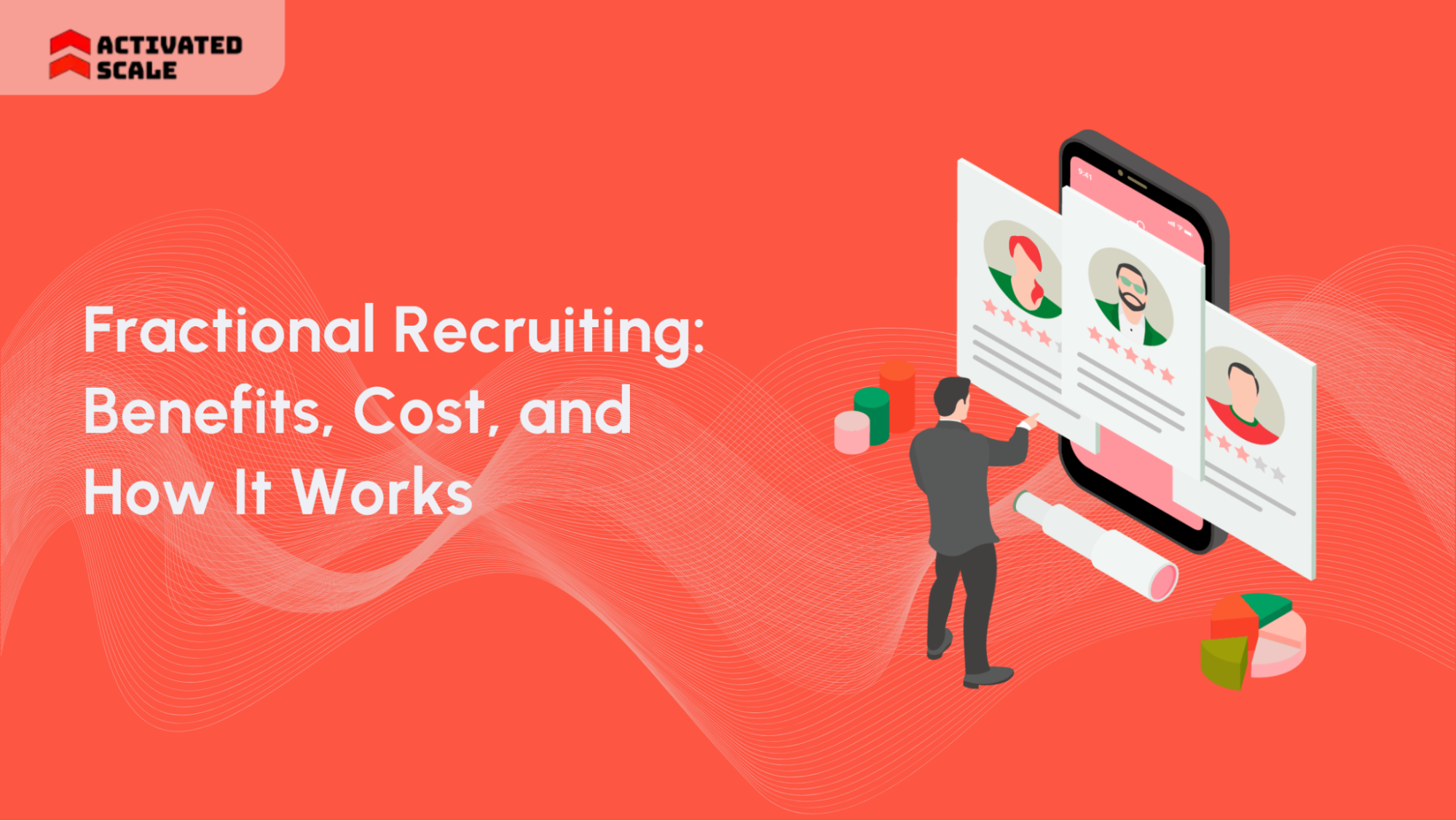Hiring has become more difficult for growing companies. You need to fill key roles quickly, but traditional recruiting methods don't keep up with your pace.
In fact, according to a Gartner survey of 190 HR leaders, 48% say that skills requirements change faster than their current systems and processes can handle. That’s where Fractional recruiting comes in. This approach lets you work with skilled recruiting professionals on a part-time basis, helping you fill important positions faster.
In this guide, you’ll get a complete breakdown of fractional recruiting, so that you can decide if it works for your business. Let’s get into it!
Key Takeaways:
- Fractional recruiting lets you access skilled recruiters without paying for full-time hiring costs or expensive agency fees.
- The fractional hiring model allows you to test recruiting quality and results before making long-term commitments.
- Many fractional recruiters specialize in specific industries and can assess candidates more effectively than generalists.
- The approach works best for companies that need recruiting expertise but lack the volume to justify full-time roles.
- You can choose from hourly rates, monthly retainers, or success-based compensation structures.
What is Fractional Recruiting?
Fractional recruiting is a flexible hiring approach where businesses work with experienced recruiters on a part-time or project basis. Instead of hiring full-time recruiting staff or using traditional agencies, companies access recruiting expertise for specific periods or projects.
Unlike traditional recruiting agencies that handle dozens of clients simultaneously, fractional recruiters work with fewer companies at once. The model works well for companies that need recruiting expertise but don't have enough hiring volume to justify a full-time recruiter.
For instance, a growing tech company might need to hire 3-4 key roles over six months. Many startups find themselves in similar situations when scaling sales teams without full-time hires, where they need specific sales talent but can't commit to permanent positions yet.
Knowing what fractional recruiting is essential, but knowing how this actually works in your day-to-day operations is what really matters.
How Does the Fractional Recruiting Process Work?
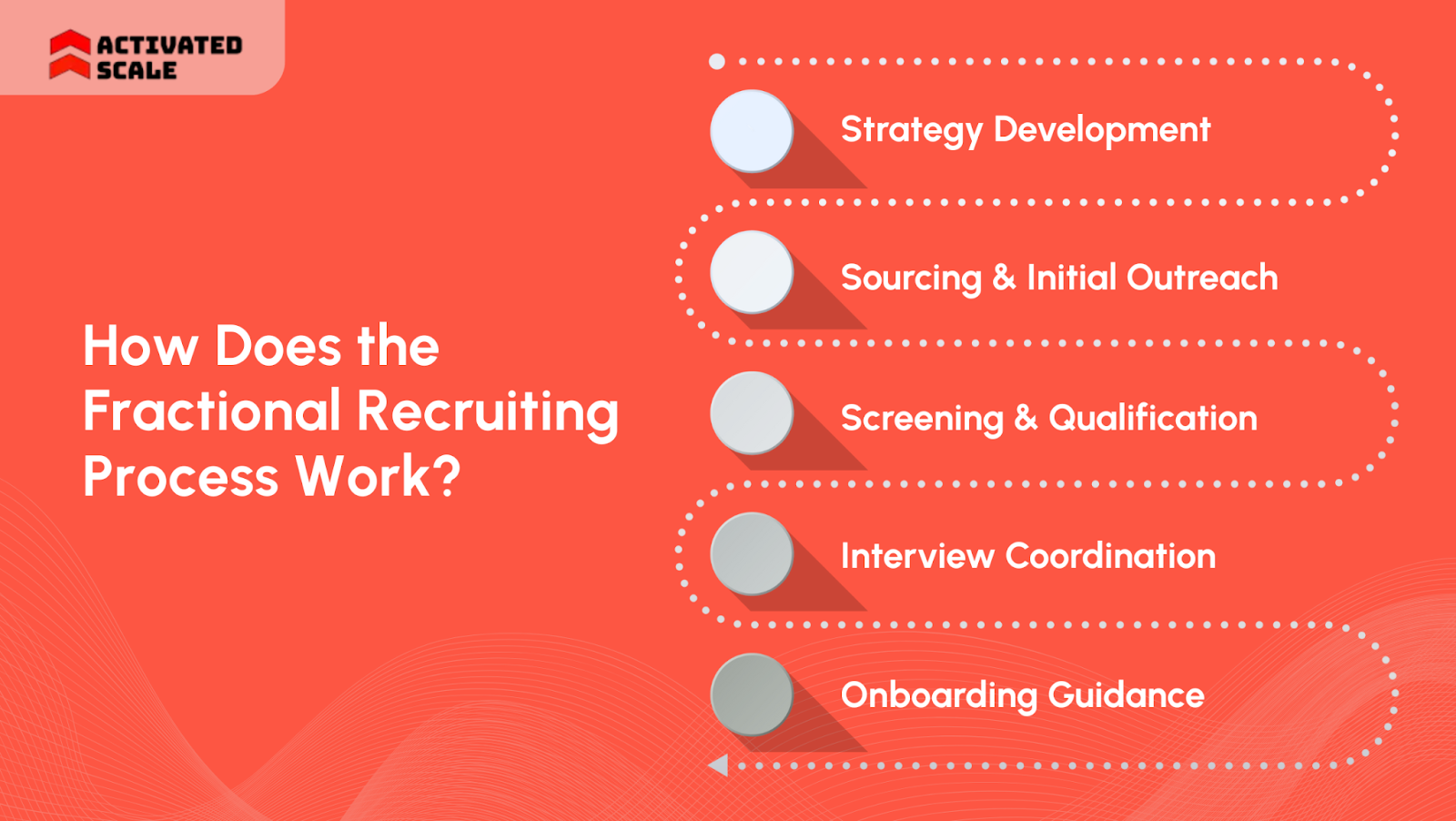
The fractional recruiting process follows clear steps that can be customized to your specific needs and timeline. Here's how successful engagements typically work:
1. Discovery and Strategy Development
The fractional recruiter begins by learning your company culture, role requirements, and ideal candidate profile. They review your current hiring challenges and analyze what has or hasn't worked in previous searches. This phase results in a customized recruiting strategy that addresses your specific needs.
Many recruiters will also assess your hiring criteria and help refine your job descriptions for top talent. This foundation work prevents common mistakes that can derail hiring efforts later.
2. Sourcing and Initial Outreach
Using their networks, tools, and industry knowledge, the recruiter identifies potential candidates through multiple channels. This includes job boards, LinkedIn searches, industry connections, and referral networks. They craft personalized outreach messages that represent your company professionally and generate candidate interest.
Experienced fractional recruiters often have access to passive candidates who aren't actively job searching but might be interested in the right opportunity. They also know how to find professionals with specific experience relevant to your industry and buyer profile.
3. Screening and Qualification
The recruiter handles initial phone screens and skill assessments to qualify candidates before they reach your team. They verify experience, assess cultural fit, and confirm salary expectations. Only candidates who meet your criteria advance to the next stage, saving your team valuable interview time.
This screening process often includes strategic interview questions designed to assess both hard skills and cultural alignment. This helps ensure you only spend time with candidates who have genuine potential for success in your organization.
4. Interview Coordination and Feedback
They manage the entire interview process, scheduling candidates with your team and gathering detailed feedback after each interaction. Many fractional recruiters also conduct in-depth interviews themselves to ensure only the strongest candidates reach final rounds.
The best fractional recruiters help you interview candidates effectively by providing guidance on evaluation criteria and decision-making frameworks. This support proves especially valuable for founders or managers who don't regularly conduct hiring interviews.
5. Offer Support and Onboarding Guidance
Once you've selected a candidate, the recruiter helps with offer negotiations and can provide guidance during early onboarding to ensure successful integration. They often stay involved through the first 30-60 days to address any issues that arise.
Seeing how the process works step-by-step helps, but you also need to know what specific benefits this approach delivers for your business.
What are the Key Benefits of Fractional Recruiting?
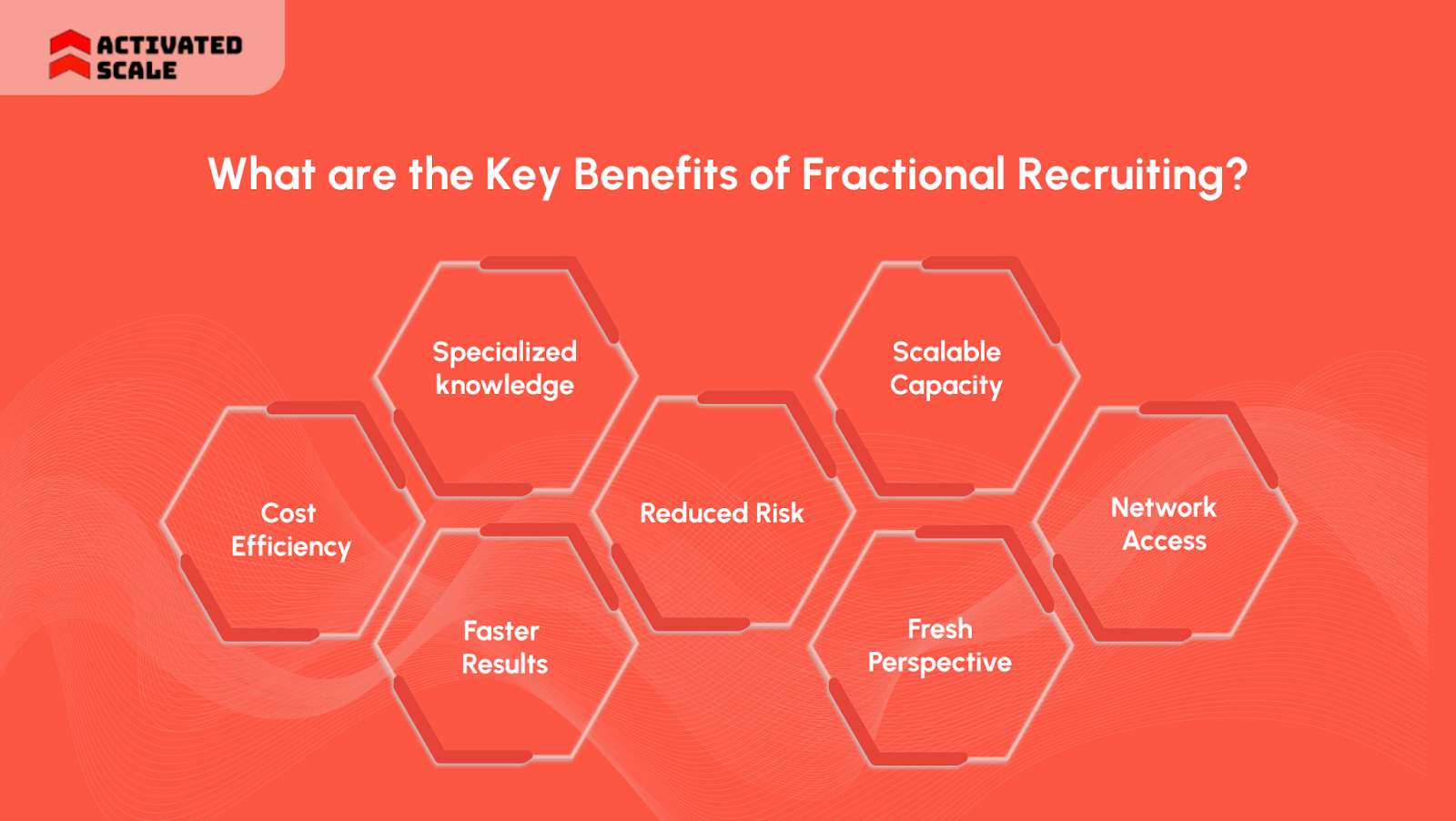
The fractional recruiting model delivers several advantages that make it particularly valuable for growing businesses. These benefits address the most common hiring pain points:
- Cost efficiency: You can save on salary, benefits, and recruiting tools while getting professional expertise.
- Specialized knowledge: Access recruiters with deep experience in your specific industry or role type.
- Faster results: Professional recruiters complete searches quicker than internal DIY efforts.
- Reduced risk: Evaluate recruiter performance before committing to larger hiring initiatives.
- Scalable capacity: Adjust recruiting support as your hiring needs change over time.
- Fresh perspective: External recruiters identify gaps in your process that internal teams miss.
- Network access: Tap into established candidate networks and industry connections.
The benefits show why companies choose this model, but timing matters just as much as the approach itself.
When Should You Consider Fractional Recruiting?
Fractional recruiting works best in specific business situations and growth stages. Knowing when this model makes sense helps you make better hiring decisions.
Companies with consistent, high-volume hiring needs typically benefit more from full-time recruiting teams. The model works less effectively when you're hiring 10+ people per month or need highly specialized internal recruiting processes.
Fractional recruiting proves particularly valuable during startup growth phases and when timing sales hires correctly. Many companies also find it helpful when building remote sales teams or expanding into new markets where local recruiting knowledge becomes essential.
Knowing when to use fractional recruiting helps with timing, but budget planning requires knowing the actual costs involved.
How Much Does Fractional Recruiting Cost?
Fractional recruiting costs vary based on engagement model, recruiter experience, and role complexity.
Here's what you can expect across different pricing structures:
Cost considerations help with budgeting, but you also need to know which types of positions work best with this approach.
Common Roles for Fractional Recruiting
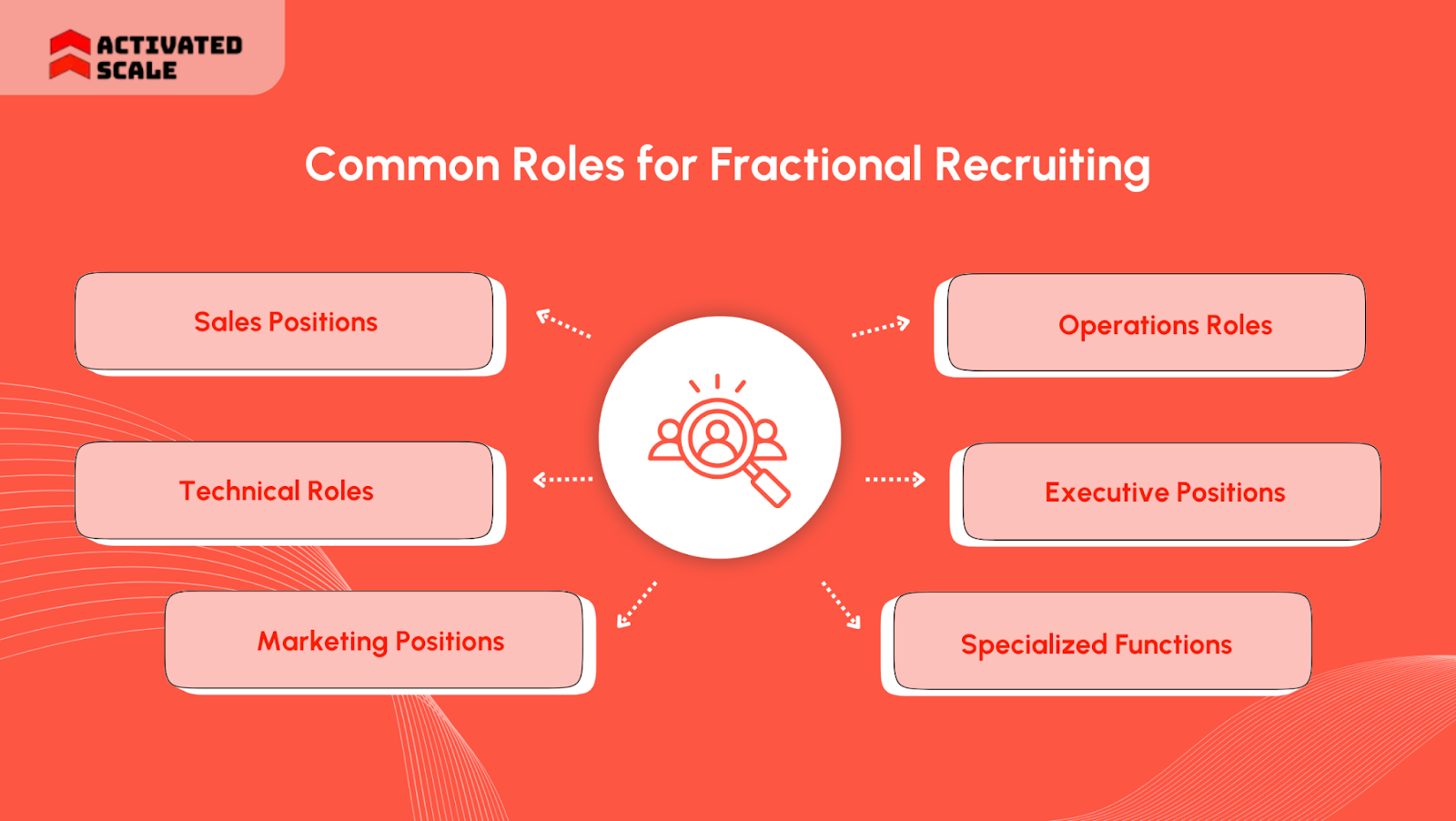
Fractional recruiting works across many different position types, with certain roles seeing particularly strong results from this approach.
The most successful fractional recruiting engagements focus on these role categories:
- Sales positions: SDRs, Account Executives, Sales Managers, and VPs of Sales benefit from recruiters who can assess relationship-building and closing skills.
- Technical roles: Software engineers, product managers, and technical leads require recruiters who can evaluate both technical skills and cultural fit.
- Marketing positions: Digital marketers, content managers, and marketing directors need recruiters familiar with modern marketing tools and strategies.
- Operations roles: Customer success managers, sales operations, and business analysts require specific skill assessment capabilities.
- Executive positions: C-level executives and department heads benefit from recruiters experienced in executive search and leadership evaluation.
- Specialized functions: Data scientists, UX designers, and compliance officers need recruiters with niche market knowledge.
While knowing which roles work well with fractional recruiting is useful, you should also see how this approach stacks up against your other hiring options.
Fractional Recruiting vs. Other Hiring Approaches
Companies have multiple options when filling open positions. Each approach offers different trade-offs in cost, speed, quality, and flexibility.
Here's how fractional recruiting compares to the most common alternatives:
Traditional agencies offer convenience but at premium pricing. They provide less personalized service and often require exclusive agreements.
In-house recruiting teams deliver high-quality results but require significant upfront investment. You need to hire, train, and equip full-time recruiters plus invest in recruiting tools and systems. This approach works best for companies with consistent high-volume hiring needs.
DIY hiring by founders or hiring managers costs the least upfront but often proves expensive in time and opportunity cost. Most business leaders lack specialized recruiting skills, leading to longer hiring cycles.
Fractional recruiting combines the expertise of professional recruiters with the flexibility and cost efficiency that growing companies need. It's particularly effective for companies scaling without full-time commitments or those exploring flexible staffing models.
Comparing different approaches helps. Now, let’s explore how an experienced fractional recruiting partner can help you.
Scale Your Sales Hiring with Activated Scale
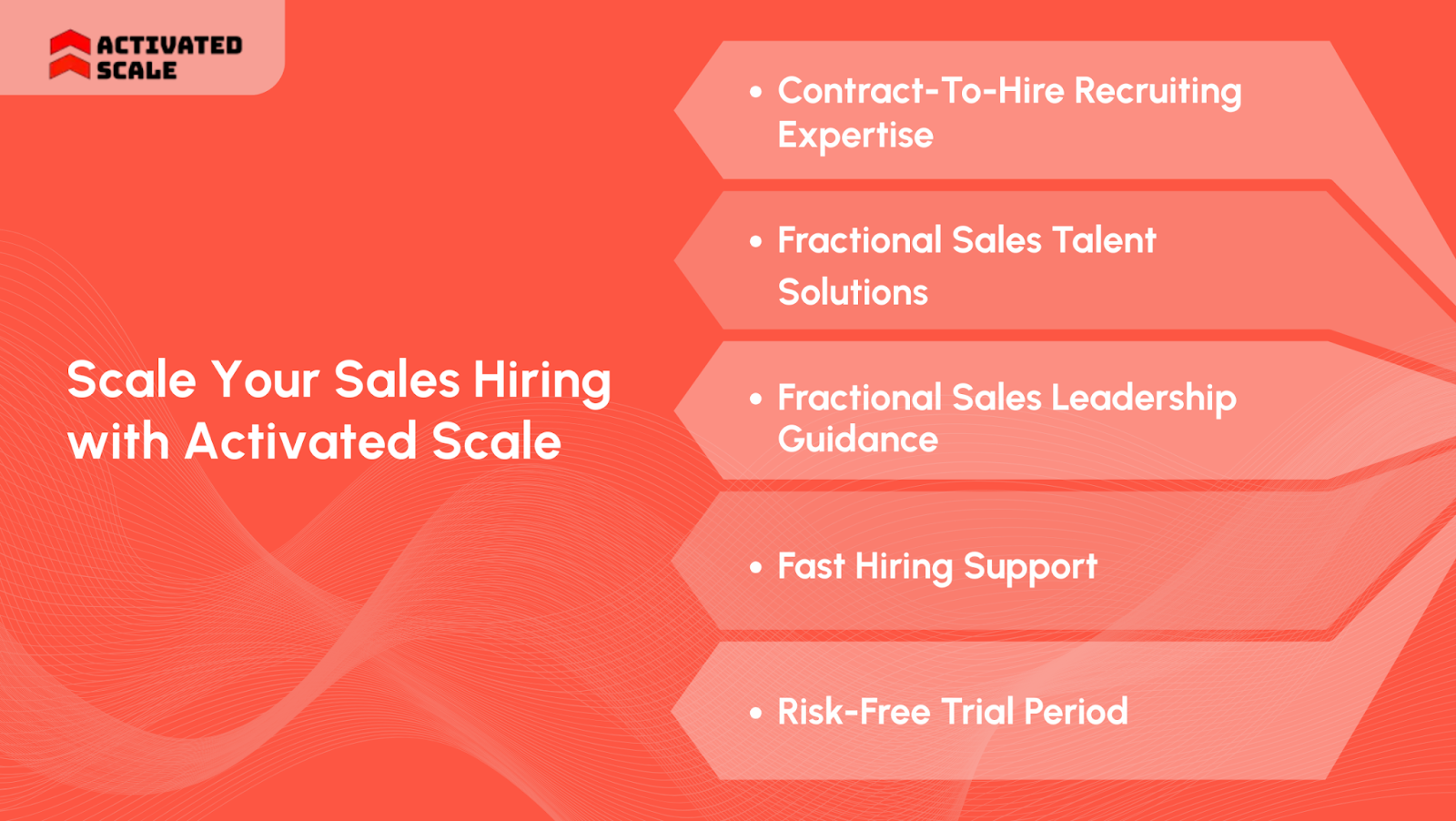
Traditional recruiting approaches often leave growing companies choosing between expensive agencies, time-consuming DIY hiring, or premature full-time recruiting investments. None of these options provides the flexibility and expertise that fast-growing businesses actually need.
Activated Scale changes this situation by connecting you with vetted, experienced sales recruiting professionals who know your growth stage and challenges.
- Contract-to-hire recruiting expertise: Test both recruiter quality and candidate fit with our proven contract-to-hire model before making permanent commitments.
- Fractional sales talent solutions: Access experienced SDRs, AEs, and sales professionals on flexible part-time arrangements that scale with your needs.
- Fractional sales leadership guidance: Work with seasoned VPs of Sales and sales leaders who can build your strategy, processes, and team structure.
- Fast hiring support: Connect with qualified recruiting support in 7 days or less, sometimes within 48 hours.
- Risk-free trial period: Test recruiting quality and fit before making longer-term commitments.
Activated Scale provides the sales recruiting expertise you need without the traditional constraints of agency relationships or full-time hiring commitments.
Final Thoughts
The fractional recruiting model works particularly well for companies in growth phases that need professional recruiting support but aren't ready for full-time internal teams.
The key to success with fractional recruiting depends on finding recruiters who know your industry, growth stage, and company culture. The fractional recruiting partner becomes an extension of your team, delivering quality hires that support your growth objectives.
Building a world-class team doesn't have to drain your budget or consume your time. With Activated Scale, you get access to vetted fractional recruiting professionals who specialize in finding top sales talent and understand your growth challenges. Schedule a call today to explore how fractional recruiting can accelerate your hiring success.
FAQs
1. What types of companies benefit most from fractional recruiting?
Growth-stage startups, SaaS companies, and businesses hiring 1-5 roles quarterly see the best results. It's ideal when you need expertise but lack full-time hiring volume.
2. Can fractional recruiters handle specialized or technical roles?
Yes, many fractional recruiters specialize in specific industries or role types. Look for recruiters with relevant experience in your market and technical requirements.
3. What should I expect in terms of time-to-hire with fractional recruiting?
Most fractional recruiters can complete searches faster than DIY hiring, typically filling roles in 4-8 weeks, depending on role complexity and market conditions.
4. What information should I provide to a fractional recruiter upfront?
Share detailed job descriptions, company culture information, compensation ranges, growth plans, and any previous hiring challenges or successes.
5. Is fractional recruiting suitable for executive-level positions?
Yes, many experienced fractional recruiters specialize in executive search for VP-level and other senior leadership roles across various functions.
The Ultimate Guide to Hiring a Salesperson!
Get the step-by-step guide to hiring, onboarding, and ensuring success!
_edi.png)
